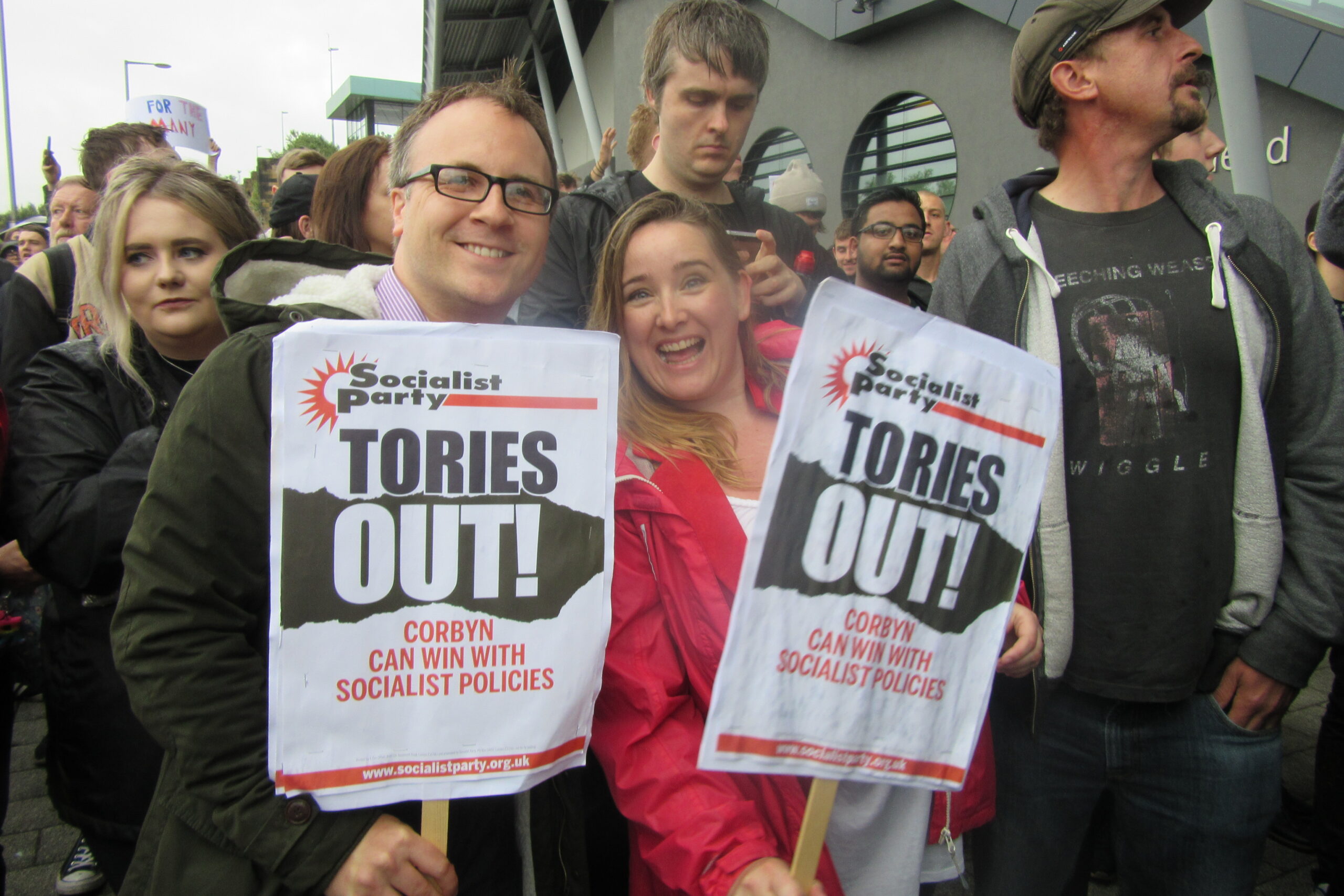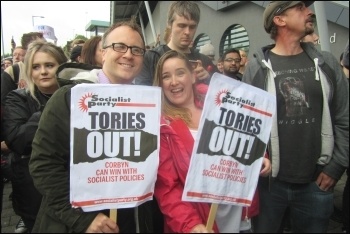One of two editorials in the Socialist, issue 953
Brexit chaos, DUP agreement, workers’ anger
Tories and May stagger on amid crisis – get them out!
Theresa May is fatally wounded but staggering on. Utterly discredited, deeply unpopular and without a shred of legitimacy, she owes her continued premiership primarily to the reluctance of her rivals to take on the unenviable task of dealing with the mess the Conservatives have landed in.
But it is not just May who is discredited. The Tories as a whole, as well as the wider capitalist establishment, have come under the ire of working class people.
The horrific crime that took place at Grenfell Tower has brought into tragically sharp focus the rotten callousness not only of May and her government, but of the capitalist system itself.
This has been further compounded by the terrible terrorist attack at Finsbury Park Mosque.
In a similar way to the atrocities which took place during the election campaign in London and Manchester, this has added to the developing sense that far from prioritising safety and security for working class people, Tory and New Labour government policies have instead helped fuel the incidences of hatred and violence in which innocent people are caught up.
It will be in the shadow of these awful events that May attempts to officially form her government. When she called the general election, it was in the confident expectation that she would be able to substantially increase her majority.
Superficial polling figures led May and her advisors, but also the vast majority of media pundits, Blairite Labour MPs and even many figures considered to be further left – such as Owen Jones – to conclude that the Labour Party led by Jeremy Corbyn would inevitably go down to crushing defeat. On 8 June they were all delivered a staggering rebuke.
May had hoped an increased majority would allow her to paper over the cracks in her own, deeply divided party.
Now she faces the nightmare of attempting to negotiate a Brexit deal that will protect the interests of big business and private profit, while simultaneously holding together her party.
But it won’t just be the backbench MPs, many desperate for a so-called ‘hard Brexit,’ who May is forced to try and placate.
Negotiations with DUP
With no overall majority in the commons, a Tory government will be forced to rely on the right-wing, sectarian Democratic Unionist Party MPs in order to pass a Queen’s Speech and to get legislation through parliament.
This is a deal that could be potentially toxic for both sides. The DUP risks alienating its voting base – which is primarily made up of working class members of the protestant community in Northern Ireland – if they are seen as underwriting brutal Tory austerity.
Similarly, the reactionary position of the DUP leadership on social issues, as well as the block they could be on the Tories implementing many of the most unpopular aspects of their cuts programme, can present major difficulties for a May government.
But perhaps even more problematic than both of these issues will be the fissures that can open up during the course of the Brexit negotiations.
These will be both between the DUP and the Conservatives and within the Tory party itself.
This nervousness has meant that no formal deal between the Tories and the DUP has yet been announced.
Among the reasons some commentators have cited for this lack of an announcement are disagreements within the DUP leadership over whether their leader, Arlene Foster, should stand alongside May in order to announce the deal.
This reflects the lack of any firm confidence that May will survive as prime minister over the course of the next five days, let alone five years, as well as her obvious political toxicity.
Queens Speech and after
Any government which is formed will be exceptionally weak and fragile. The Queen’s Speech was shorn of most of the policies outlined in the Tory manifesto – including the removal of the ‘pensions triple lock’ and the hated ‘dementia tax’.
It is good that Jeremy Corbyn has said he plans to amend the speech and ask the Commons to back him. We argue he should put forward all of the hugely popular pro-working class policies that were contained in the Labour manifesto. But the fight will not just take place inside the House of Commons.
As the Queen’s Speech is heard, protesters, including many organised by the Socialist Party, will be gathering outside the walls of parliament.
And it won’t stop there. A potentially huge demonstration is set to take place on 1 July. Correctly, John McDonnell has argued that the Trade Union Congress (TUC) should put its weight behind this protest which, if fully mobilised, could see more than one million people on the streets.
The Socialist Party agrees, and would argue that the TUC – which brings together the majority of the trade unions in Britain – should fully take on the tasks of organising and building the event.
Indeed, it is incumbent on the trade union leaderships to help harness the overwhelming mood of workers to fight austerity.
This is a mood that has been strengthened in resolve by the general election result. And it does not stop at demonstrations.
Faced with a mass rebellion, including huge protests, demonstrations and crucially, coordinated strike action, this government could be forced from power.
Corbyn’s increased authority
Jeremy Corbyn has emerged from the election in a stronger position. Indeed, the ruling class’s fear of a Corbyn-led government and the appetites that it could awake among working class people is the most powerful pressure on May and the Tories to cling to power.
But this strengthening of Corbyn’s hand should not be misinterpreted as an end to the bitter civil war that has been waged over the course of the last two years with the majority of Labour’s right-wing MPs, councillors and machinery.
Only this week we have seen further attempts at so-called cross-party unity on the question of Brexit – with Yvette Cooper and others calling for ‘moderates’ within all parties to unite in the interests of big business for a ‘soft Brexit’.
But the real issue is not ‘soft vs hard’ Brexit but ‘bosses vs workers’ Brexit. What unites the Blairites with both the soft and the hard brexiteers on the Tory benches is their commitment to protecting the interests of the super-rich 1%, albeit with some differences of opinion on how best to achieve this.
So far, Jeremy Corbyn has rightly argued for a “jobs-first Brexit“, including in his most recent interview with Robert Peston.
But he must now go further. The Socialist Party argues that Corbyn should make his starting point for any Brexit negotiations the implementation of policies which will benefit working and middle class people – beginning with those in the Labour manifesto.
This would mean annulling all EU laws which might stand as an obstacle to this – including those which oppose nationalisation, for example.
It would also mean offering workers much greater protections than those currently offered under EU legislation while removing all laws which act to protect private profit at the expense of working class people.
As well as outlining a positive programme on Brexit and other issues, it is also vital that Corbyn mobilises his supporters in order to take on the right-wing saboteurs within his party.
This means supporting measures like democratic mandatory reselection of MPs, as the Socialist Party has argued, and opening up the party to all anti-austerity forces to participate on a federal basis.
If you agree, join us and get involved.
This version of this article was first posted on the Socialist Party website on 20 June 2017 and may vary slightly from the version subsequently printed in The Socialist.








